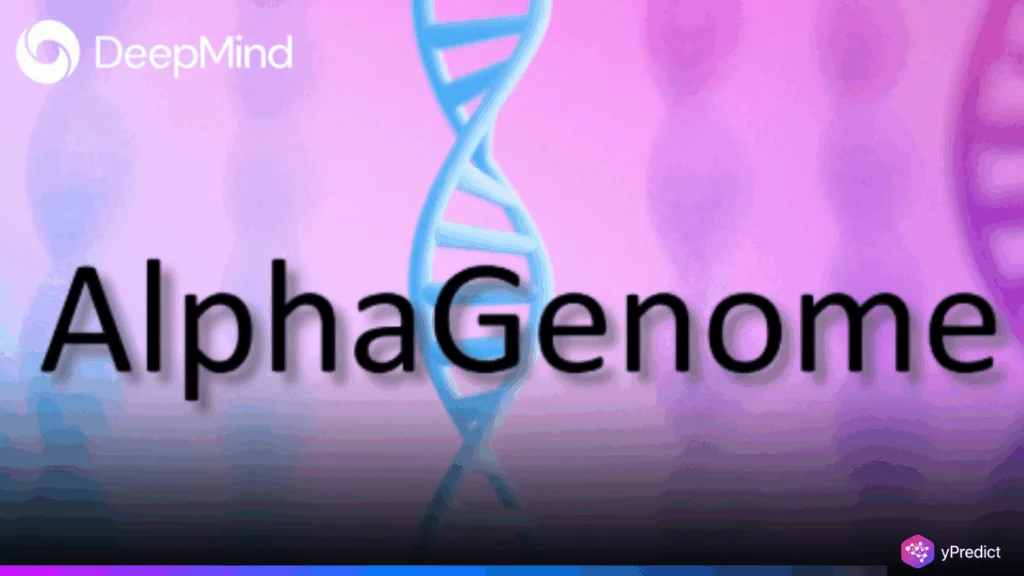
DeepMind has launched AlphaGenome, an AI genomics tool that predicts how gene regulation will be affected by single DNA mutations. The DeepMind model provides broad genomic coverage and base-level precision for exploring non-coding DNA.
Moreover, it can simultaneously analyze up to a million DNA base pairs using a hybrid neural network. AlphaGenome is now accessible through a preview API for non-commercial research. It has the potential to revolutionize synthetic biology, gene expression analysis, and disease research.
AI Genomics Redefining the Genomic Map
AlphaGenome is a significant step forward in understanding our genome’s “dark matter,” or areas that were previously thought to be unreadable. Only 2% of our DNA codes for proteins; the rest is non-coding DNA, often tied to diseases but poorly understood. Therefore, AlphaGenome targets the remaining 98%, in contrast to previous models like Enformer, which concentrated on coding sequences.
This DeepMind model blends transformer architectures with convolutional layers. It offers detailed information on mechanisms such as transcription factor binding and RNA splicing. Additionally, it forecasts the origin of genes, their activation, and the effects of variants on gene regulation. Thus, AlphaGenome’s adaptability allows it to combine several tasks into a single, scalable solution.
DeepMind Model Outperforms All in DNA Insight
AlphaGenome delivers insights at a scale never seen before. It provides thorough predictions of biological activity and can process up to a million base pairs. In experiments, the DeepMind model beat other models in 24 of 26 tasks that required predicting variant effects.
AlphaGenome correctly detected a mutation in T-cell acute lymphoblastic leukemia that activates the TAL1 gene linked to cancer. Additionally, it permits binding of MYB proteins. Thus, this accuracy of precision may open up ways for discovering the origins of diseases hidden in non-coding DNA.
Experts agree this could shift the research landscape. Dr. Caleb Lareau of Memorial Sloan Kettering called it “a milestone.” Additionally, Professor Marc Mansour praised AlphaGenome’s scale, pointing out that identifying relevant mutations in non-coding DNA has long been a challenge. Thus, this new tool allows global labs to evaluate mutations and simulate edits more quickly than before.
Can This DeepMind Model Reshape Disease Discovery?
AlphaGenome has provided new opportunities, but there are limitations. It still has trouble predicting effects from DNA segments that are more than 100,000 base pairs apart. Additionally, the model has not yet been approved for clinical use or personal genome interpretation.
DeepMind is inviting researchers to test the tool using a preview API and contribute to the community forum. As labs worldwide begin using it, AI genomics could see acceleration in understanding how non-coding DNA shapes health and disease.
This DeepMind model might grow to forecast even more intricate interactions with upcoming updates. AlphaGenome is a way to interpret life’s instruction manual, from rare disease mapping to synthetic biology. Furthermore, because it scores variants in less than a second per mutation, it is scalable.
Final Thoughts
AlphaGenome represents a change in the way we investigate DNA. By combining scale, speed, and detail, it may become the backbone of modern AI genomics. The model gives scientists a digital microscope they have never had before to decode the invisible genome.
However, additional validation is needed for clinical impact. It provides a cohesive strategy that fills in the gaps left by scattered tools and different data. Thus, as researchers continue to experiment with AlphaGenome, it might uncover new biological processes. These are processes we have never been able to see before.






